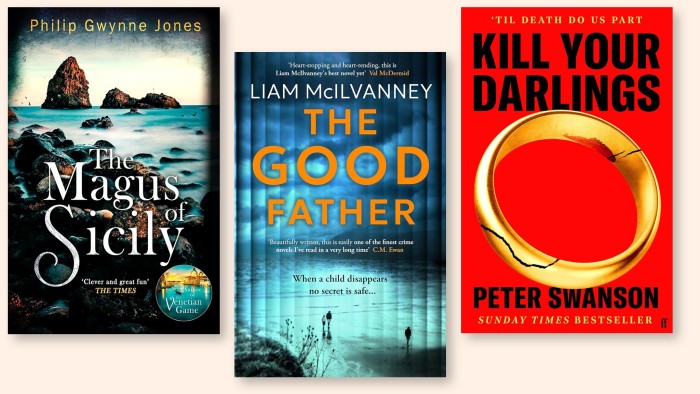Unlock the Editor’s Digest for free
Roula Khalaf, Editor of the FT, selects her favourite stories in this weekly newsletter.
“We’re all islands shouting lies to each other,” according to Rudyard Kipling. But where would practitioners of crime fiction be without the all-deceiving falsehood?
Take The Good Liar by Denise Mina (Harvill Secker £16.99/Mulholland Books $29), in which the talented Scottish writer delivers another excoriating saga of murder and guilt. Claudia, a widowed forensic examiner, has forged a technique of analysing blood splatter that has taken her profession by storm. After a brutal stabbing, she has brought down a killer — but is the imprisoned man really guilty?
About to give a key speech, Claudia agonises over revealing a grim truth that will destroy her reputation. And as a native Glaswegian struggling with the mores of the English upper crust, she is out of her comfort zone. Intelligent as ever, Mina judiciously orchestrates suspense and anatomises issues of class — and even the nature of truth.
Similarly, Laura Shepherd-Robinson’s The Art of a Lie (Mantle £18.99/ Atria Books $28) tackles the human capacity for dissembling in a richly textured narrative, reminding us that Shepherd-Robinson has few equals in the field of the historical crime novel. As with Mina’s latest, the heroine here, confectioner Hannah Cole, has lost a husband, the murdered Jonas, whose creative accounting has left her virtually penniless.
Magistrate and real-life master of the 18th-century novel Henry Fielding is investigating Jonas’s killing, and concludes that the dead man was a cruel and abusive husband. Did Hannah murder him — before introducing to the English palate a new Italian delicacy called “iced cream”? Everything we go to Shepherd-Robinson for is here in abundance: vivid scene setting, acute sense of period, quirky characterisation.
Here’s a question that crime fiction reviewers are asked on an almost weekly basis: is the Nordic noir phenomenon finally over? The answer: not really. While the mega-sales of many Scandinavian writers are somewhat in abeyance and there are no massively successful television series of the order of The Killing and The Bridge, the best Nordic practitioners have hung in there and are still producing sterling work.
Such as the uncrowned king of the Icelandic branch of the genre, Arnaldur Indriđason. The stygian nights of his country — and its recent dramatic history (including societal and financial unrest) — are refracted through the writer’s work. The Quiet Mother (translated by Philip Roughton; Harvill Secker £14.99/Minotaur Books $29) is vintage Indriđason. A woman is murdered in her Reykjavík home, leaving a note for retired detective Konrád, pleading that he finds the child she gave up half a century ago. Konrád’s investigation uncovers a succession of dramatic revelations linked to a decades-old murder — and his own past. This is comprehensive proof that the crown rests securely on King Arnaldur’s head.

There are, however, younger Scandinavian pretenders biting at his heels — such as Eva Björg Ægisdóttir, whose name may be a challenge for Anglocentric readers but whose work is authoritative and engaging. Home Before Dark (Orenda £16.99) is translated by the doyenne of her profession, Victoria Cribb, and begins in Iceland in 1967. Teenage Marsí has been corresponding with a boy on the other side of the country, but she has been masquerading as her own older sister.
When, however, a meeting is arranged, she finds herself unable to go, and her older sister disappears during the night of the meeting, her bloodstained anorak discovered at the proposed rendezvous. Ten years later, suffering disturbing dreams, Marsí receives a letter from her unseen pen pal. Is he a psychopath and a threat to her? This is psychological thriller writing of a rare order and evidence that any comments about the demise of Scandicrime are greatly exaggerated.
The broad canvas of crime fiction has always had room for innovative, unorthodox outings, and aficionados of the work of Massachusetts-resident writer Peter Swanson can always count on him to deliver something unusual, as with Kill Your Darlings (Faber £18.99/William Morrow $30).
The reverse chronology narrative here begins with an attempted murder at a dinner party. The aspiring killer is Wendy Graves, a failed poet whose husband Thom has written a murder mystery — a version of their own story; we are told in riveting detail what inspired this attempted homicide. Swanson is an aficionado of the films of Alfred Hitchcock, and this one (while not quite his best work) exerts the same merciless grip.

Finally, two very different but equally beguiling crime entries. The Good Father by Liam McIlvanney (Zaffre £16.99) shows that the writer has inherited his nigh-legendary father’s writing skills (William McIlvanney was the progenitor of Tartan noir); the disappearance of a couple’s child inexorably tears the parents apart — while Philip Gwynne Jones’s The Magus of Sicily (Constable £22) invokes Italy’s most exquisite island as a setting for myth and murder. This is Swansea-born Gwynne Jones (who now lives in Venice) using his adopted country in truly evocative fashion.
Barry Forshaw is the author of ‘Euro Noir’
Join our online book group on Facebook at FT Books Café and follow FT Weekend on Instagram, Bluesky and X
